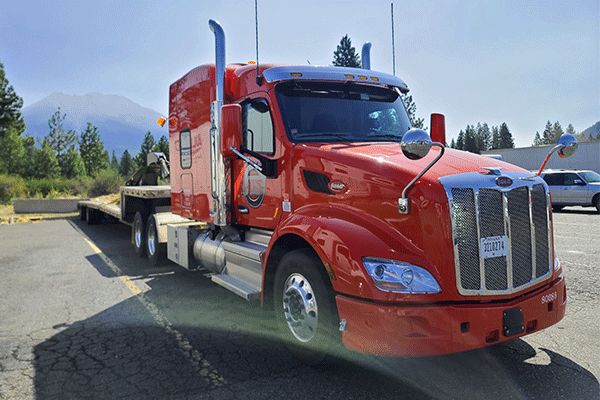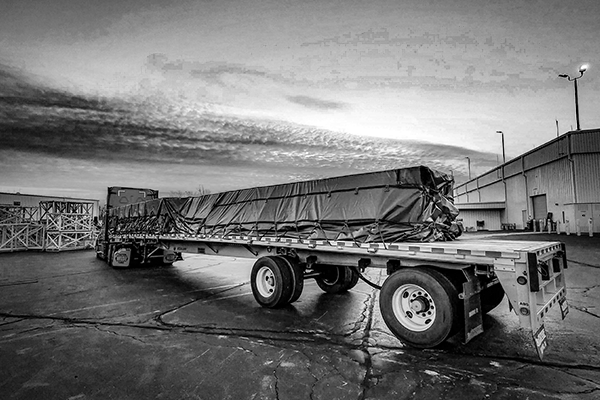
As a leader in your organization, there are constantly things vying for your attention. Things that need your time, your opinion and your expertise.
Although it’s nice to make a difference and the value you bring to the table extends beyond your job description, there simply isn’t enough time in the day to do it all.
Whether it’s a stack of paperwork, a list of phone calls or a last-minute scramble to find a new solution for your freight because your first truck fell through, you just can’t seem to get ahead.
Rest assured though, you’re not alone. This world is full of logistics professionals who also struggle to make their schedules work for them. And, without understanding how to avoid common time-wasters in their day to day, they’re never able to get out of this rut.
But this won’t be you. Not anymore.
Today, you’re looking for a way to get more from all those hours spent at the office dedicated to a company you love. And we’re here to help you.
At ATS, we’ve been helping businesses refine their transportation processes for over 65 years so we understand the lasting effect wasted time can leave on many companies. Companies that don’t even realize how much time they’re losing; how much time they could get back.
In this article, we’ll open your eyes to — and give you some tactics for avoiding —the top five largest time wasters logistics professionals encounter throughout their day-to-day activities.
The top five biggest time wasters for logistics professionals, no matter the industry, are:
- Miscommunication of critical information in planning.
- Planning based on unrealistic commitments from providers.
- Chasing down updates from stakeholders.
- Outdated technology - Manual updates to paperwork and TMS
- Putting out fires and holding other companies accountable.
Let’s jump in.
1. Miscommunication of Critical Information in Planning
Often, the initial planning stage of a shipping project is the most important to ensure everything goes as expected. When go-time rolls around and truck drivers show up at a pick-up location without fully understanding what they’re walking into, even the best-planned project can quickly be derailed.
This is why making sure all parties involved are armed with the information they need — information that could impact the success of the project — in the early planning stages is critical.
Without understanding core pieces of information like the nature of the freight they’ll be transporting, special instructions at pickup or delivery, or whether it requires accessorials, costly delays can occur.
For your load to go as smoothly, and quickly, as possible it’s important that you communicate all pertinent details upfront.
You’ll get a lot of time back in your day by not having to reschedule a pick-up because the driver on your freight didn’t realize he’d need tarps.
As such, make sure to communicate as much information as you can before you tender your freight to a transportation company. This includes, but isn’t limited to:
- Total cargo height
- Total cargo width
- Total cargo length
- Total cargo weight
- Location of origin
- Location of destination
- Pick-up timeframes (date, windows)
- Drop-off timeframes (date, windows)
- Your contact information
- Your consignee’s contact information
- Instructions for the driver
- Where to park
- Which side of the building to enter on
With all of this information, a good transportation provider will be able to find the best-fit solution for your needs. It becomes much more difficult and time-consuming to relay details after a trucker begins the process of hauling your load.
As such, save the time that many logistics professionals waste by clearly and fully outlining the specifics of your freight.

2. Planning Based On Unrealistic Commitments From Providers
If you’re hoping to make the most of your efforts, doubling the work you put in — only to end up with the same result — is the last thing you want to do.
You wouldn’t push your lawnmower around the entirety of your yard without starting it up first or bake a pie without turning on the oven. In both of these situations, you wouldn’t make any progress toward your end goal. That grass would still be too long, your pie uncooked.
The same can be said of holding unrealistic expectations for your transportation providers. Without giving them the tools they need to succeed, they’ll likely fail; leaving you in the lurch, back at square one.
As such, save time by understanding what’s truly realistic to ask of your providers.
For example:
If you have a strict 8 a.m. Monday morning pick-up appointment — an appointment time that’s usually difficult for truckers to meet — expect to pay a bit more to secure capacity.
Should that same load — based on your requirements — need to be carried 500 miles and meet a 4 p.m. drop-off appointment at your consignee, this urgency, distance and strict timeframe will, naturally, increase your rate.
Based on the nature of the transportation business, to get the job done, a shipment like this needs to be priced appropriately.
That said, this price point — which accurately depicts the cost of providing this service — won’t be as low as you might like. As a result, many shippers may search for a lower rate — which won’t be hard to find.
Someone will always say they can do it for cheaper, that’ll never change.
But, without the tools needed to get this shipment moved, it’s likely that the transportation provider responsible for initially underpricing your load — to get your business — will fail when it matters.
Situations like this happen far too often in the transportation world and when they do, good logistics managers — who were depending on an unrealistic commitment — are forced to continue their search for a solution.
In turn, this wasted time hinders their ability to reach a higher level of efficiency in their jobs.
You’ll want to avoid this disruption. To do so, make sure to understand the following things:
- How far can a truck driver realistically travel in a day?
- How do hours of service (HOS) impact your ability to meet tight timeframes?
- How does lead time impact the price of getting freight moved?
- Is it possible to add flexibility to my timeframes and equipment type requirements?
- What is the real cost of cheap freight shipping?
Everyone wants your supply chain to stay on track. The health of our economy depends on it. That said, holding unrealistic expectations for your transportation providers can hurt your ability to do so. Save some time by understanding their capabilities and adjusting accordingly.
 3. Chasing Down Updates From Stakeholders
3. Chasing Down Updates From Stakeholders
As a logistics manager charged with maintaining relationships with suppliers, transportation companies and internal stakeholders, you understand how damaging shoddy communication can be.
Too often people spend their time chasing down updates and pertinent information both internally and externally. That said, in your position, time isn’t on your side. Doing your job correctly requires a high level of oversight on your behalf but accumulating all the information needed to keep things moving can be difficult.
You shouldn’t need to chase down updates on when your inbound shipment will be arriving, where your outbound freight is or whether your consignee has people on sight to offload products.
Without the proper systems in place, however, this is exactly how you’ll spend time.
As such, it’s important that you set yourself up for success; make it easy for the information you need to arrive at your doorstep. Transfer the effort you’re putting into chasing down updates into added productivity by investing in technologies that make this pain-free.
Luckily, there are plenty of internal and external communication software created to help you expedite these processes. Here are a few:
Great software for alleviating internal communication issues:
Great software for external logistical communication:
Even though leaning on these technologies can go a long way toward expediting communication between your business and external communication stakeholders, working with a great provider will help even further.
The best transportation partners — be it freight brokers, 3pls or trucking companies — understand the importance of communicating every step of the way. As such, these service providers commit themselves to doing just that.
By offering load-tracking visibility, striving to provide only the best-fit truck for their customers and coordinating across supply chains for inbound freight, great transportation providers will chase down and provide the updates you need.
If you’re finding it difficult to acquire the insights necessary to keep your freight moving and your supply chain on schedule consider revisiting the partnerships you hold.
You deserve a transportation company that cares about your business; a company that will work as hard as you are to facilitate its success.
4. Making Manual Updates to Paperwork and Systems
Oh, paperwork. The opposite of enjoyable; the antithesis of a good time. Whether it’s your bill of ladings, invoice documentation, arrival notices, carrier insurance or W-9 forms, paperwork isn’t hard to come by in the transportation industry.
That said, all of that looseleaf documentation soaking up cabinet space in your building doesn’t need to kill your time. Too many logistics professionals run into issues managing the organization and updates to the paperwork that’s vital to their success.
Without utilizing the technologies available, these individuals bog down their time unnecessarily; doing things that could be automated for them.
You see, in today’s digital age, software companies around our nation and world offer tools specifically designed to solve these issues. With their help, you’ll find that the tedium of locating, updating, housing and collaborating on documents — documents that are central to your business — can be done at the touch of a button.
Although the upfront costs of document management systems like LogicalDoc, Templafy and DocumentLogistix may seem steep, the increased workflow productivity you’ll gain, following implementation, will pay for itself many times over.
As such, if you’ve found it difficult to manage all of your documentation, consider adding a helping hand to your processes in the form of a shiny, new, software system.

5. Constantly Putting Out Fires to Hold Others Accountable
Your job shouldn’t make you feel like you’re on an island. There are plenty of other people who care about your business’s logistical success, but sometimes it doesn’t seem like it. The relationships you hold with transportation providers should make your life easier, not add to your workload.
That said, there are plenty of bad providers in the transportation industry. And, holding these companies to their word and ensuring they follow through can become a huge time waster for good logistics managers.
The best transportation companies strive to remove the burden of solving issues from their customers’ plates. With their help, logistics managers save time they’d normally spend hunting down a new truck when something falls through, scheduling a new pick-up time and communicating with their consignees and carriers.
Honestly, though, it can be difficult to know whether the company you’ve added to your supply chain will do these things. To help you do this, check out some of the tools below:
- 7 Signs to Know if You’re Hiring a Stable Transportation Provider
- The Freight Brokerage Selection Checklist
- The Freight Brokerage Common Mistakes Guide
- What Are The Different Types of Freight Brokers?
Really, You Get What You Pay For
If there’s one thing I want you to take away from this article it's this: You get what you pay for in the transportation world.
Whether it’s by purchasing a new technology to expedite your intra-company communication processes or steering clear of the cheapest available rate, invest in your logistics.
Trying to cut costs, and hoping you’ll skirt by despite it, will end up costing you time and more money in the end.
Here at ATS, we see transportation professionals make these costly mistakes all the time. That said, we’ve made it our mission to help them navigate and avoid these issues.
To do so, we publish educational content to our Learning Hub multiple times every week. Check it out, I’m sure there’s something there for you.




